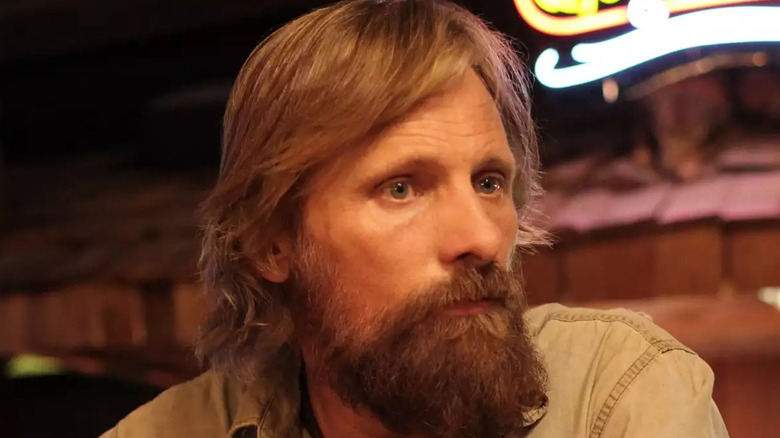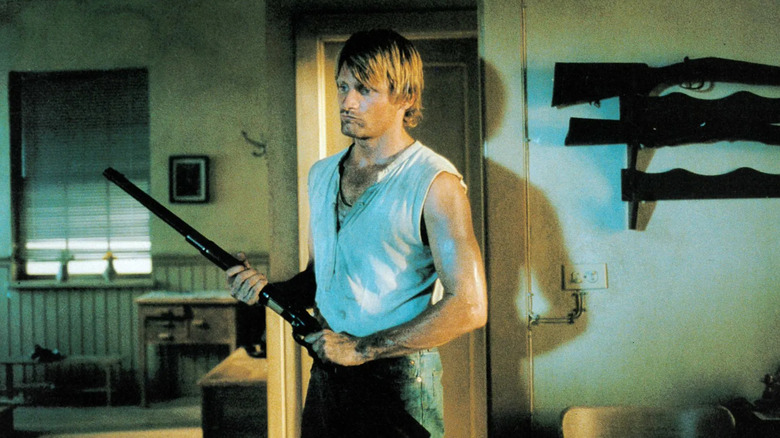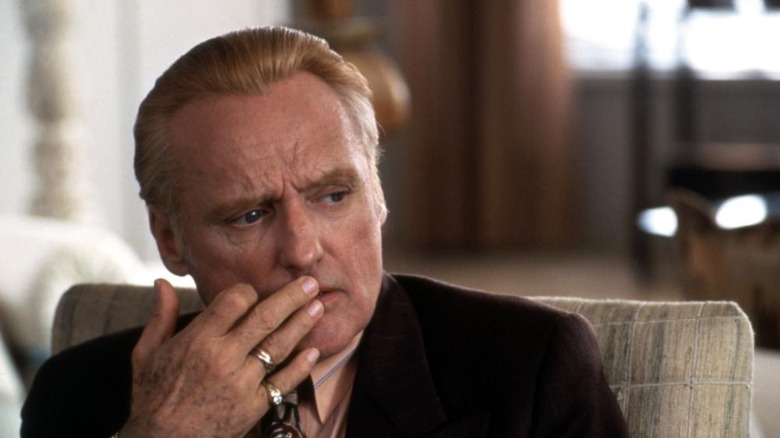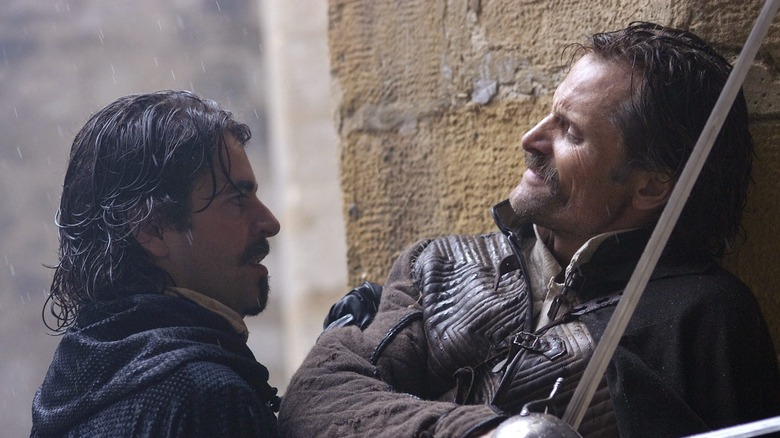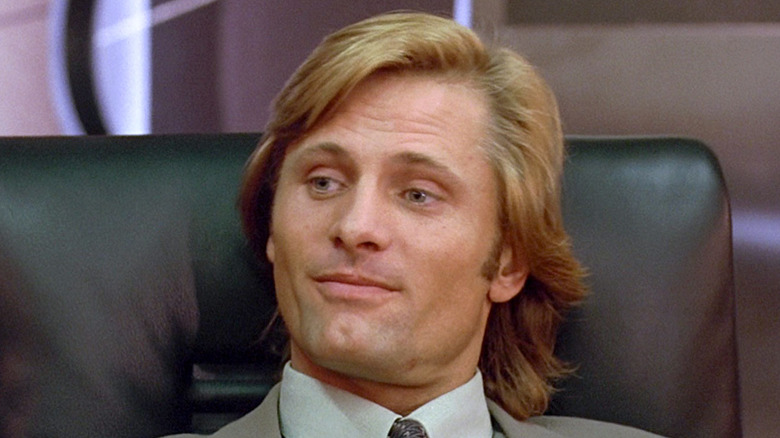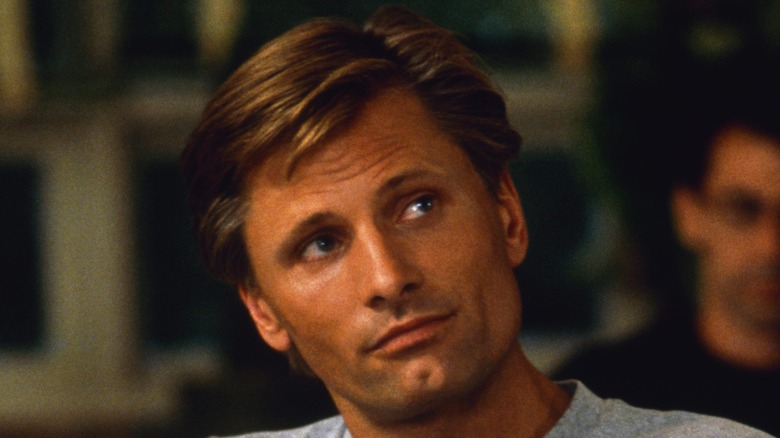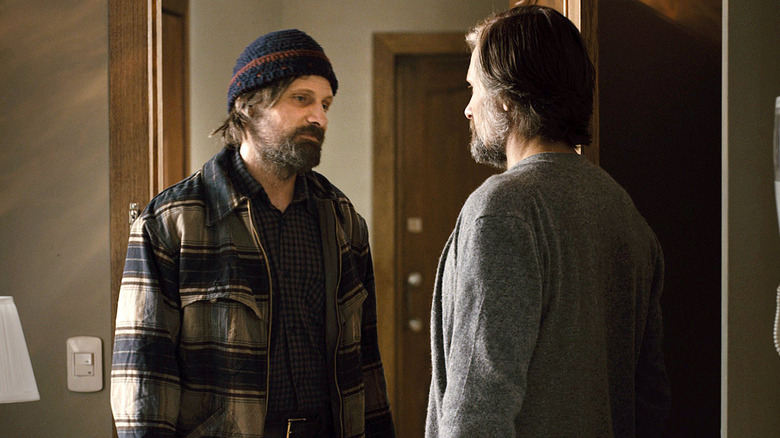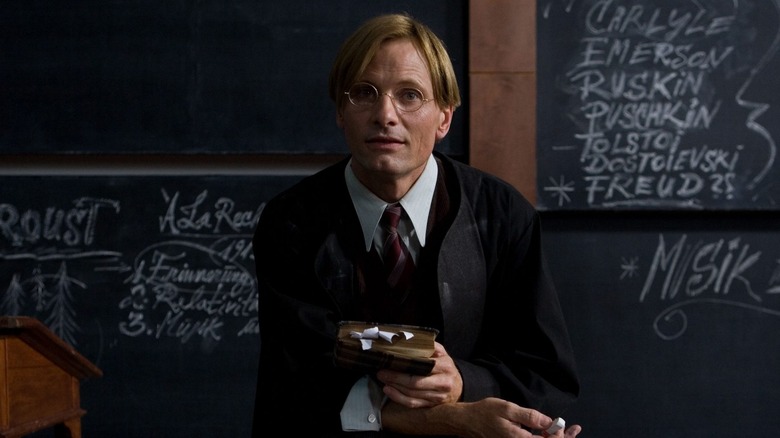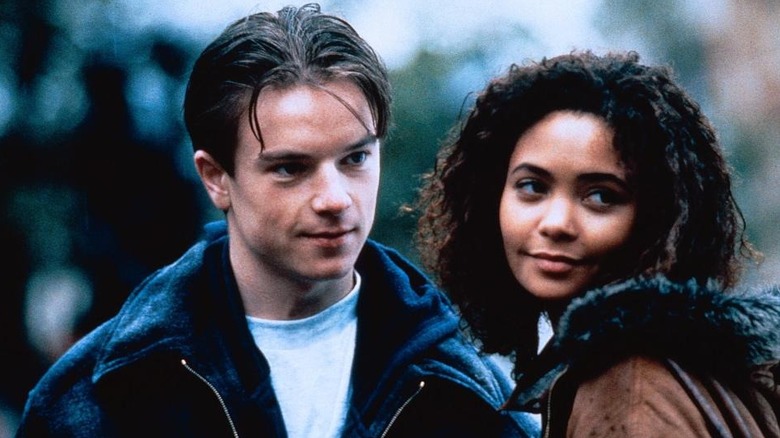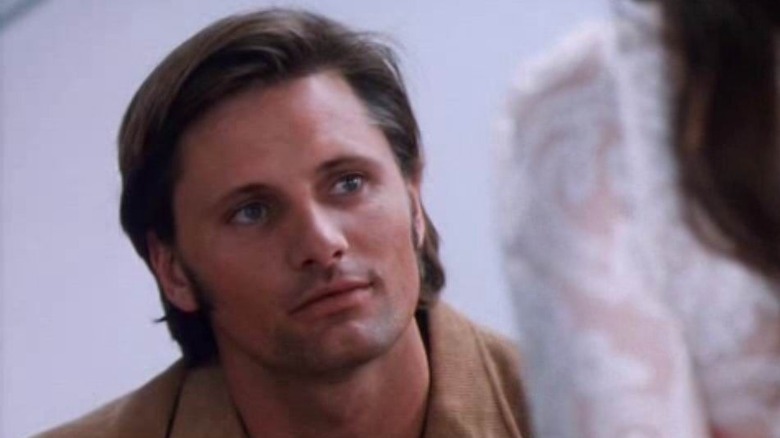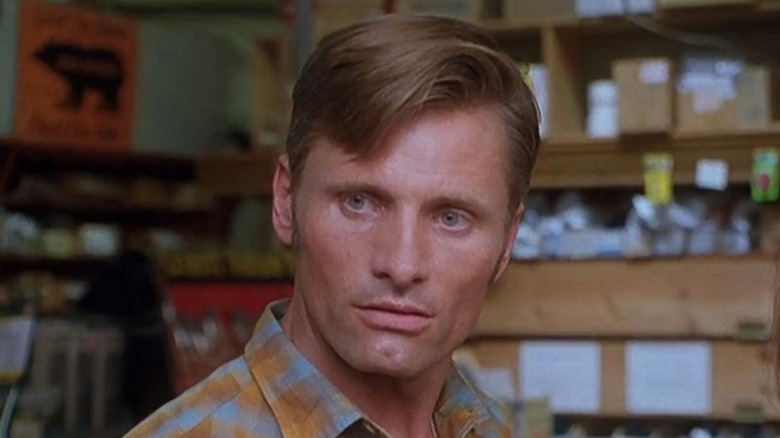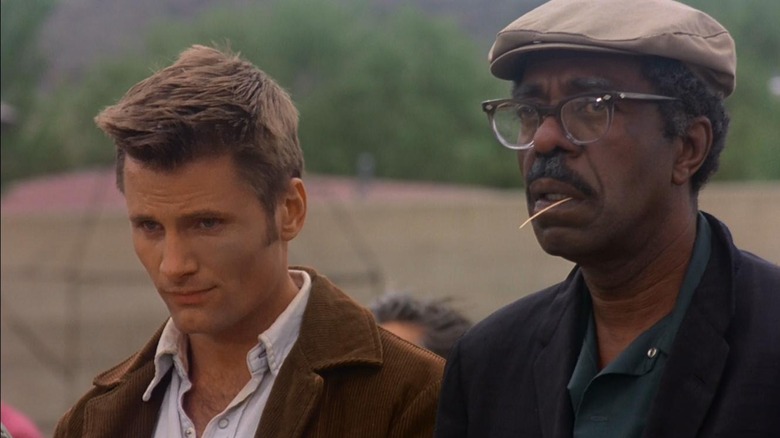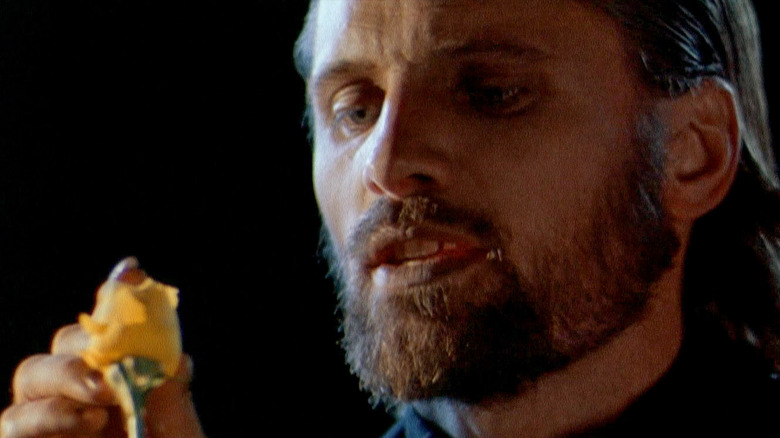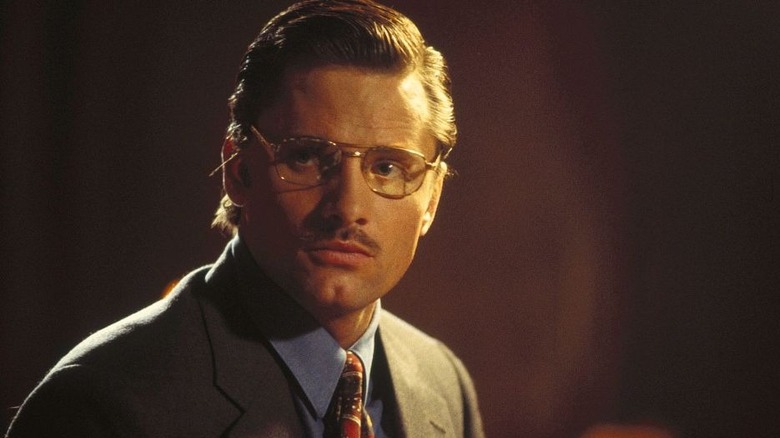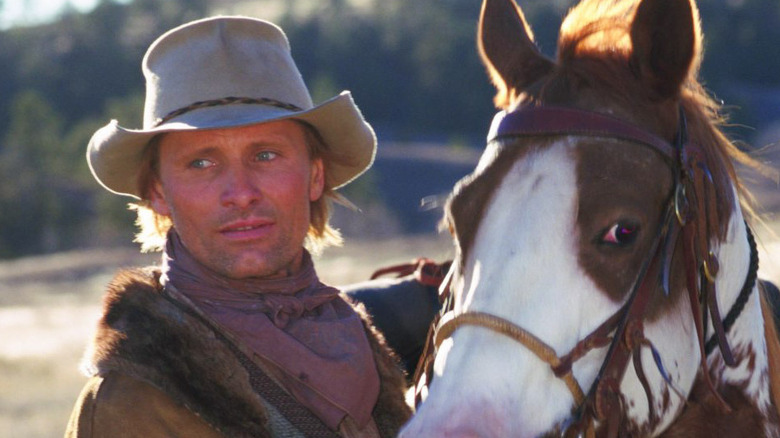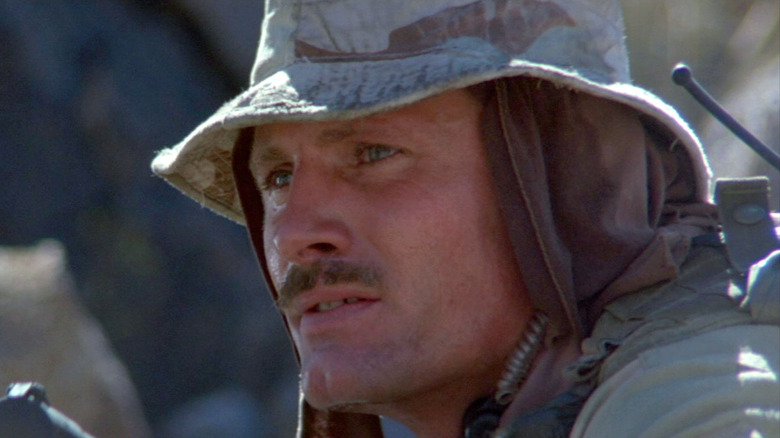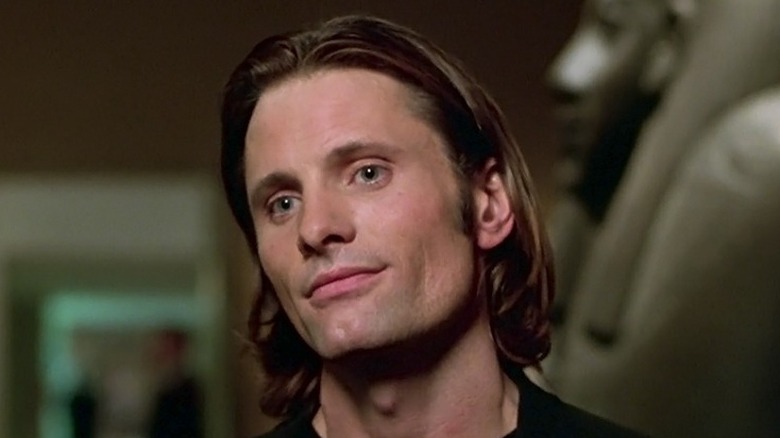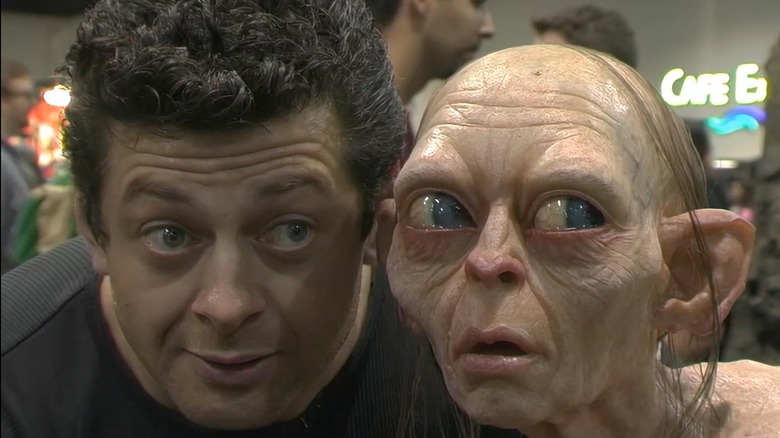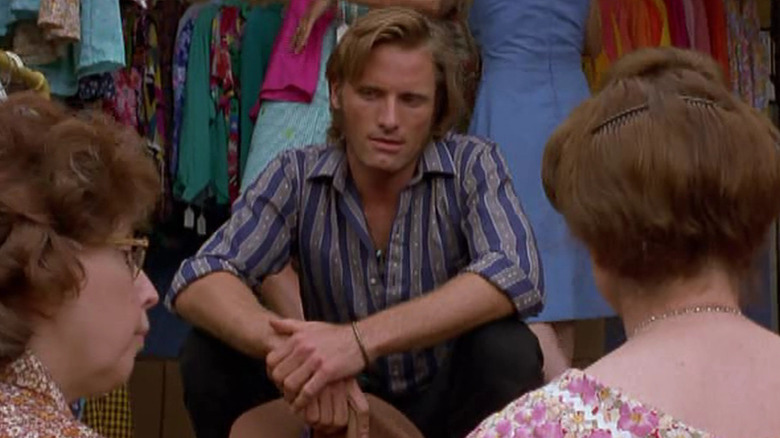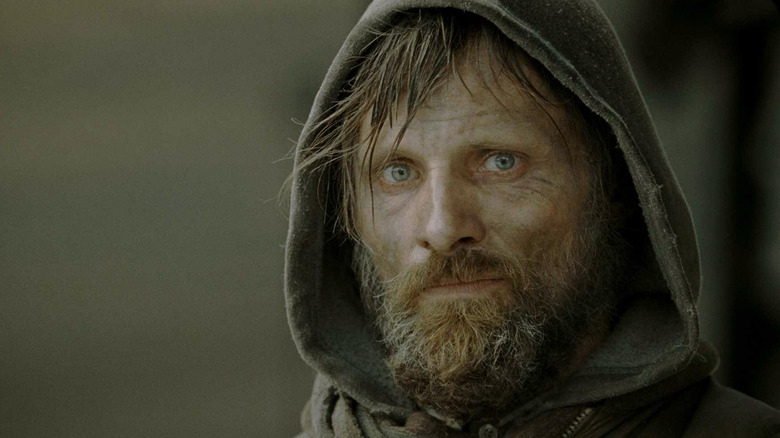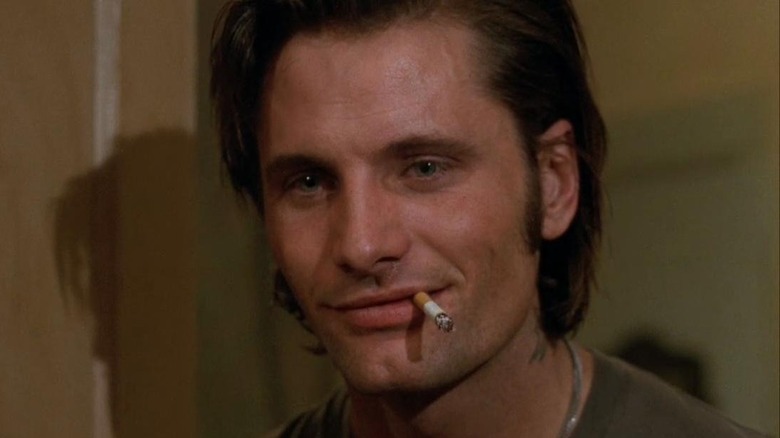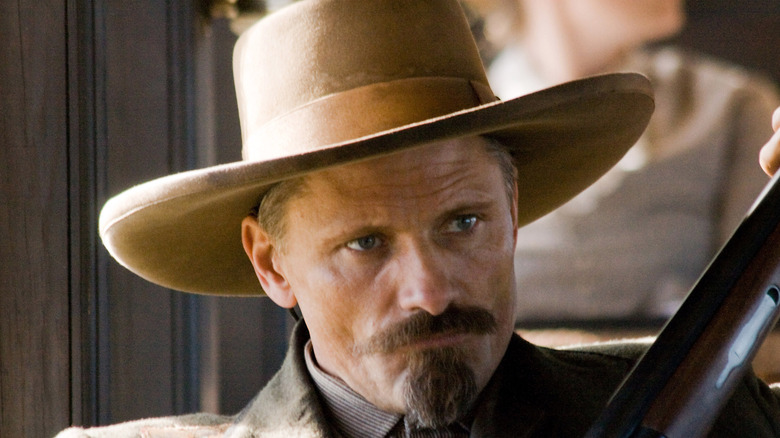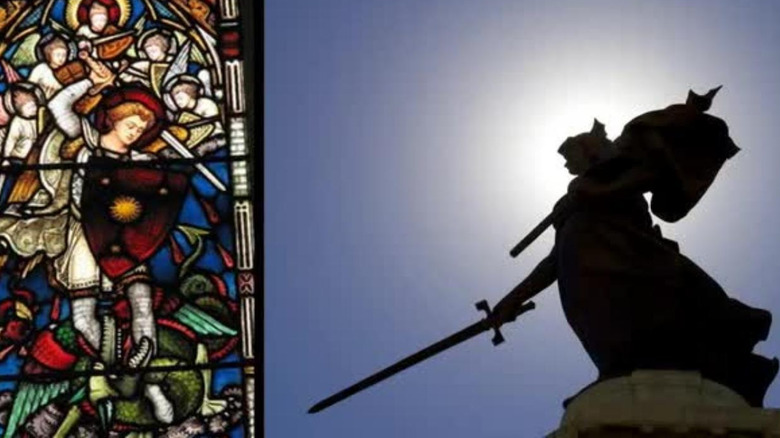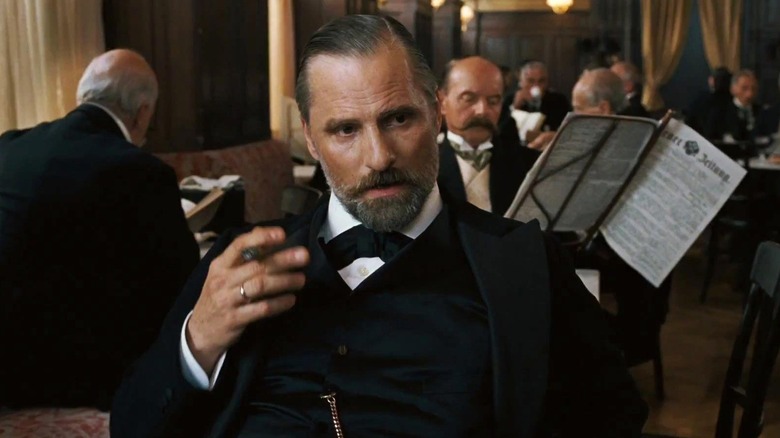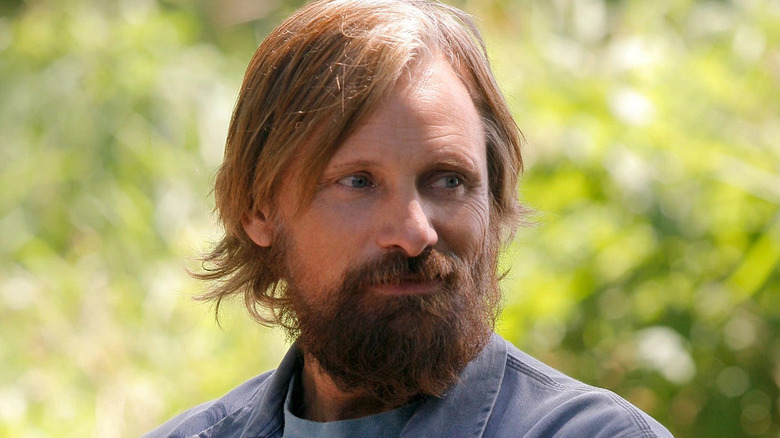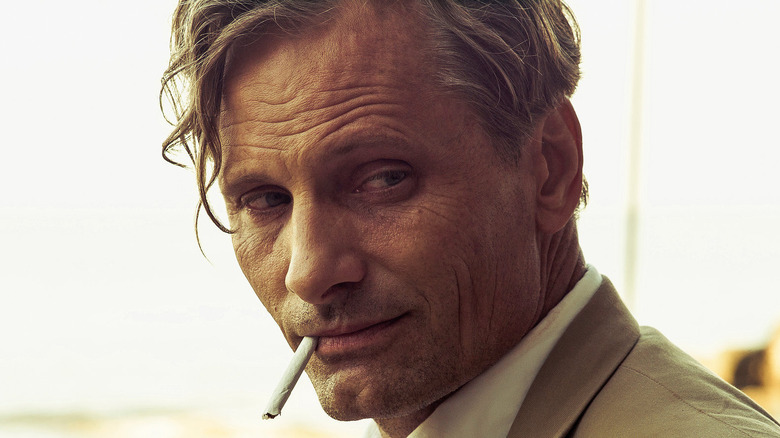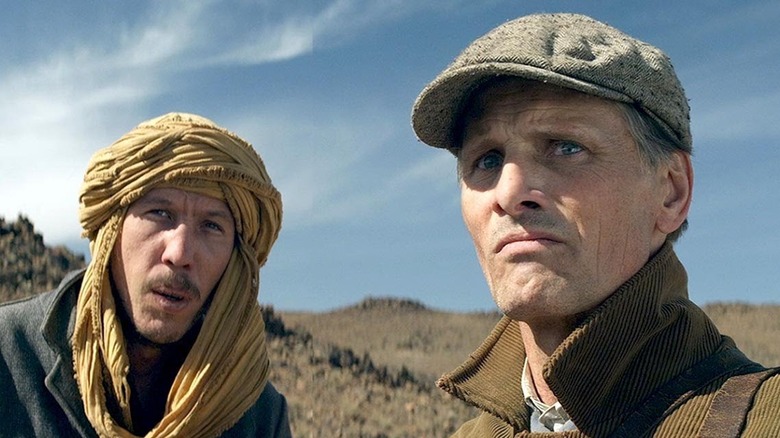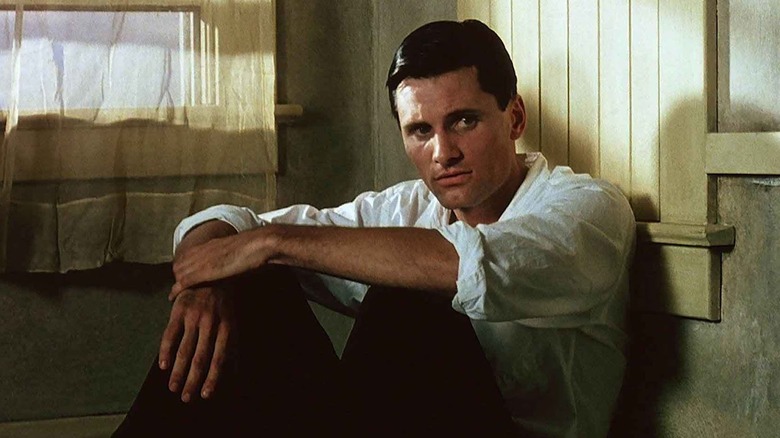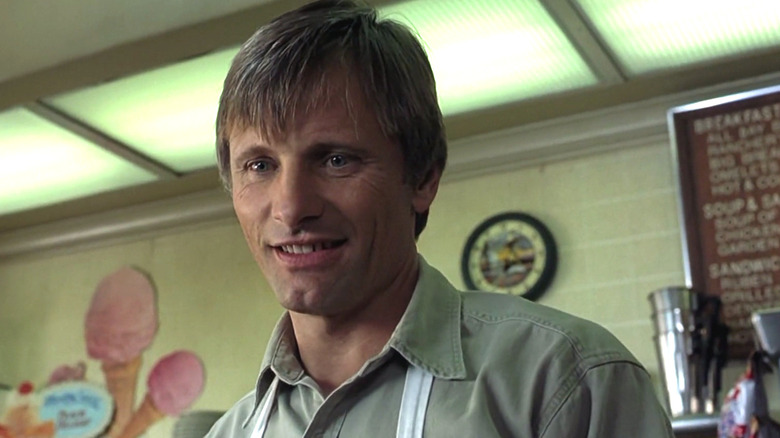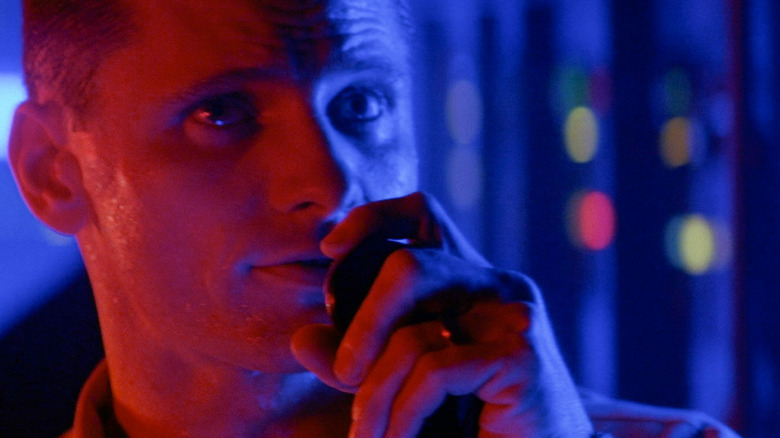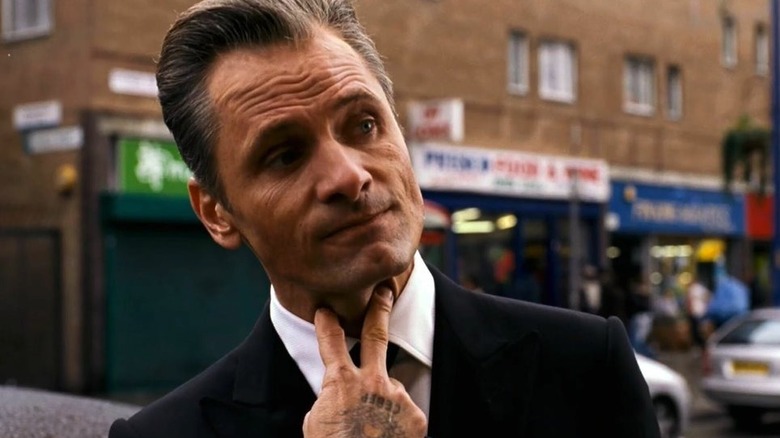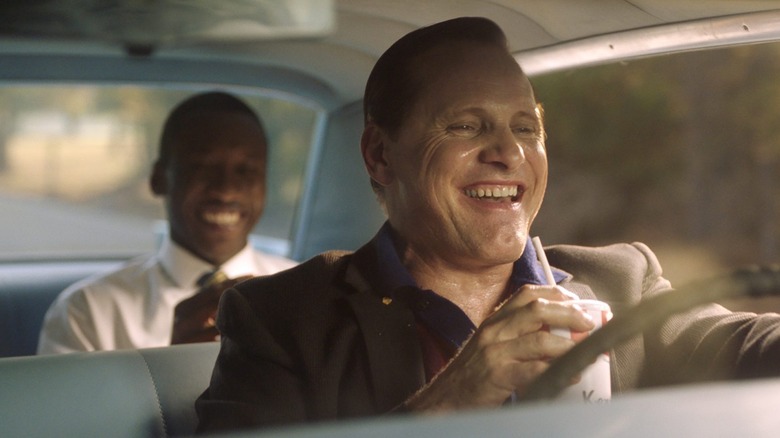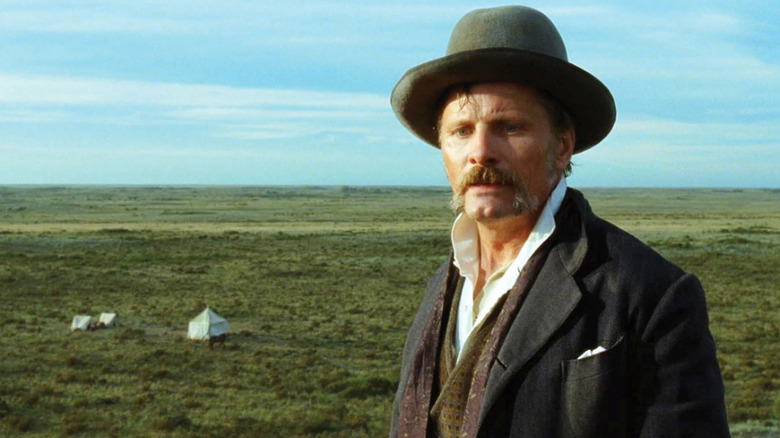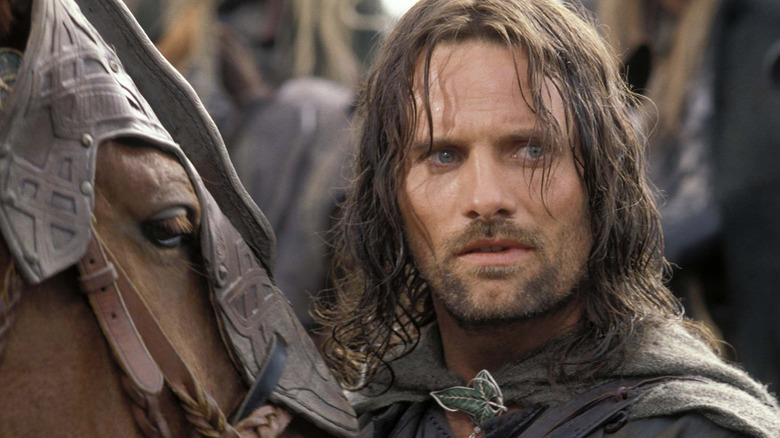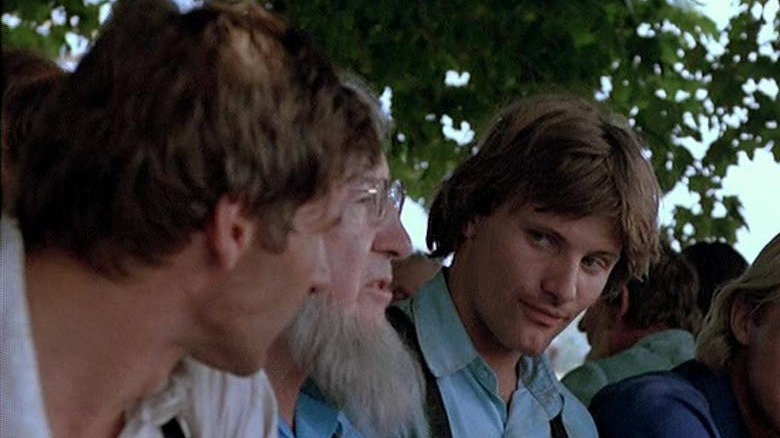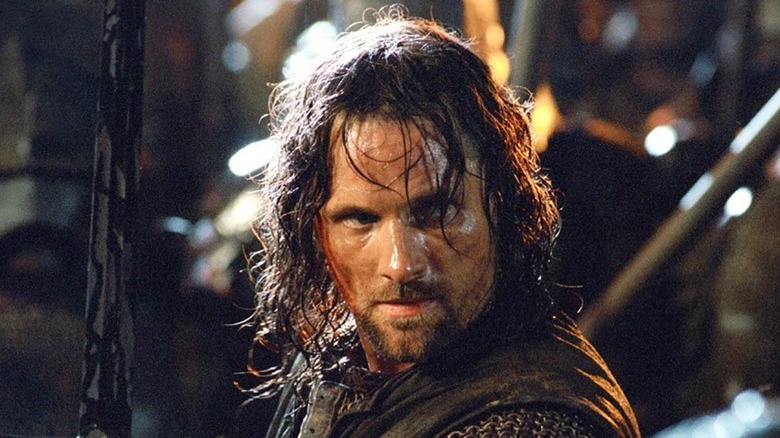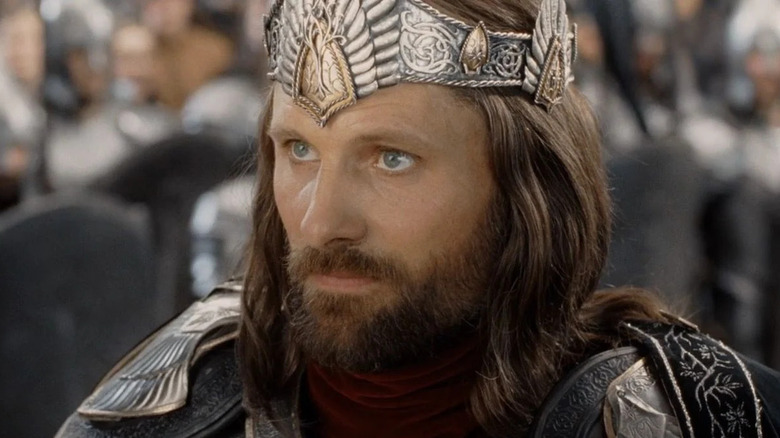36 Viggo Mortensen Movies Ranked Worst To Best
Viggo Mortensen has had a long, storied career that's spanned numerous genres and dozens of substantial character roles. Even in otherwise subpar movies that failed to achieve critical or commercial success, Mortensen's performances have been highlights, with the actor always managing to convey a quiet strength.
Featured in predominantly smaller roles throughout the '90s, Mortensen rose through the ranks of the international and independent film industry until he achieved mainstream success in Peter Jackson's award-winning fantasy trilogy, "The Lord of the Rings." His prominent role as Aragorn led to renewed attention for Mortensen and a greater variety of new acting opportunities, including such acclaimed films as "A History of Violence," "Captain Fantastic," and "Green Book."
Since his debut in 1985's "Witness," Mortensen has garnered significant praise from critics and awards organizations. He's not just a lauded actor, either: he's also a poet, artist, musician, and publishing house founder. His off-screen activities have only enhanced his image as an off-beat hero.
Here are all of the most noteworthy movies that Viggo Mortensen has appeared in, ranked from worst to best.
36. The Passion of Darkly Noon
A lesser-known entry in Mortensen's filmography, "The Passion of Darkly Noon" stars Brendan Fraser as the titular Darkly Noon, a young man who's spent his entire life in an ultraconservative Christian cult. After his parents' deaths and the cult's dissolution, Darkly wanders into the mysterious forests of the Appalachian Mountains, meeting an assortment of odd and interesting characters, including a woman to whom Darkly is instantly attracted (Ashley Judd) and her mute boyfriend (Mortensen).
"The Passion of Darkly Noon" received middling reviews upon its release in 1995, although filmmaker Philip Ridley's direction of the movie was positively received and achieved cult status in later years. For his work on the film, Ridley shared the prize for Best Director at the International Fantasy Film Award with Kazuyoshi Okuyama. "A backwoods religious allegory of obscure intent, 'The Passion of Darkly Noon' puts a good cast to work on a tale scarcely worth telling," wrote Variety's Todd McCarthy.
Playing the character of Clay, Mortensen does a fantastic job conveying emotion through body language and facial expressions alone. He pulls off the difficult task of remaining sympathetic while lacking a voice, becoming the polar opposite of Fraser's emotionally repressed, internally conflicted Darkly Noon.
35. Boiling Point
Based on Gerald Petievich's book "Money Men," 1993's "Boiling Point" focuses on a Treasury Agent (Wesley Snipes) tracking down a pair of con artists (Dennis Hopper and Mortensen) who killed his partner. He has only one week to find the duo and arrest them before his transfer.
A largely forgettable crime thriller, "Boiling Point" received almost entirely negative reviews from audiences and critics alike, with the most common complaints being the film's slow pace, unoriginal plot, and bland script. "In this adaptation of one of Petievich's first books, writer/director (James B.) Harris gets the look and the pace right but somehow the film doesn't quite make it," said Austin Chronicle's Louis Black.
Mortensen appears as one of the main antagonists: the young, easily manipulated criminal Ronnie, who finds a mentor in Dennis Hopper's more experienced, conniving professional conman, Red. Mortensen infuses plenty of naïveté and youthful ambition into Ronnie's personality, making him appear quick to please but also hopelessly in over his head when it comes to Snipes' determined, vindictive main character.
34. Captain Alatriste: The Spanish Musketeer
One of several international movies Mortensen has starred in, "Captain Alatriste: The Spanish Musketeer" is a 2006 Spanish epic war film based on the popular series of novels centered around fictional 17th-century Spanish soldier, Captain Alatriste. In the film, which takes place amid the 80 Years' War, Alatriste (Mortensen) is a daring military commander whose best friend falls in battle. Per his friend's dying wish, Alatriste returns to Madrid to care for his friend's son (Unax Ugalde), taking the young man under his wing as a squire.
"Captain Alatriste: The Spanish Musketeer" is a movie that harkens back to the swashbuckler movies of the '40s and '50s, featuring Mortensen in a role that would've suited Errol Flynn or Douglas Fairbanks. However, Mortensen manages to portray Alatriste with enough realism to prevent him from becoming a stereotypical larger-than-life figure like Zorro or Robin Hood. He's a man, not a folk hero.
"Captain Alatriste" received little attention outside of Spain, with reviews split between acclaim within the country and less enthusiastic reviews among international audiences. "(The) pic features top-notch production values, but its visual flair and some good perfs by well-known contempo Spanish actors cannot redeem an over-episodic, over-busy script with little dramatic undertow," wrote Variety's Jonathan Holland.
33. Daylight
A little-known Sylvester Stallone film, 1996's "Daylight" stars the Italian Stallion as an EMS squad leader in a race against time to save a group of people trapped in a weakened tunnel beneath the Hudson River. Given the quality of the film, which has few memorable plot points, it's probably not too surprising that it remains so obscure today.
When it was released to theaters, "Daylight" failed to earn many positive reviews, with many critics deeming it a weak, conventional entry in the disaster film genre. "'Daylight' is the cinematic equivalent of a golden oldies station, where you never encounter anything you haven't grown to love over the years," said the famous film critic Roger Ebert. However, the movie was still a major financial success, grossing $159.2 million on a budget of $80 million (via Box Office Mojo).
Mortensen plays a supporting role in the film as a smug tycoon-slash-mountain climbing enthusiast who attempts to lead a small group of survivors out of the caved-in tunnel. Though playing a stereotypical character in the disaster genre, Mortensen had a handful of enjoyable sequences in the film as a foil for Stallone's more cautious EMS chief. Surprising no one, the character meets his demise when he arrogantly dismisses Stallone's warnings about the tunnel's instability. It was a very different sort of character for Mortensen—a stock character, essentially—but one that he fleshed out well.
32. 28 Days
A dramedy that focuses more heavily on the drama than the comedy, "28 Days" follows a newspaper columnist named Gwen (Sandra Bullock) who enters a drug and alcohol rehab center to treat her alcoholism. A box office success that raked in $62 million on a budget of $43 million (according to Box Office Mojo), "28 Days" earned divided reviews from critics.
Some praised the performances of the talented main cast, including Bullock, Mortensen, Diane Ladd, Alan Tudyk, and Steve Buscemi. Others felt that the movie was too condescending, presenting weighty subject matter in a "superficial" manner (the general consensus on the movie's Rotten Tomatoes page). "The movie '28 Days' begins with such a flurry of promise that it comes as a sharp disappointment when this drug-rehab comedy skids out of control and begins to weave around as unsteadily as its central character does in the movie's opening scenes," said The New York Times' Stephen Holden.
Mortensen co-stars in "28 Days" as Eddie Boone, a famous pro baseball player who enters the rehab center for drug, alcohol, and sex addiction, and eventually falls into a complex relationship with Gwen. As a recovering addict, Eddie becomes invaluable in Gwen's recovery. The two of them help each other overcome their addiction and move past their respective traumas in numerous tender, poignant interactions together.
31. Everybody Has a Plan
Another of Mortensen's foreign language films, "Everybody Has a Plan" stars Mortensen as a pair of estranged twin brothers, Pedro and Agustín. Tired of his difficult life in Buenos Aires, Agustín assumes his brother's identity after Pedro's sudden death. Soon, he finds himself dragged into the criminal underworld his brother was a part of, having to adapt to his new, dangerous surroundings.
"Everybody Has a Plan" was a decent film, with critics praising Mortensen's dual performance as the twin brothers at the heart of the movie. However, most agreed that the movie lacked a cohesive plot and failed to deliver anything memorable aside from its dreary tone and Mortensen's performances.
"Mr. Mortensen keeps you watching, even when the movie's storytelling underwhelms. But 'Everybody Has a Plan' is less about story than about texture and atmosphere," said The New York Times' Rachel Saltz. In the film, Mortensen does a great job portraying the world-weariness of Agustín and the shadiness of his brother, Pedro, managing to make both characters as separate and distinct from each other as possible.
30. Good
Based on the well-received stage play of the same name, "Good" follows the life and career of a humane, idealistic German professor of literature, John Halder (Mortensen), who finds himself praised by the burgeoning Nazi Party in the 1930s. As the professor attempts to advocate for morality within the Nazi Party, he gradually gives into careerism, selling out his friends, family, and ideals for his own selfish gain.
The film adaptation of "Good" failed to garner nearly as positive a response as the original stage production had. Premiering at the 2008 Toronto International Film Festival, the movie received mixed to average reviews. Most critics were of the opinion that the movie was an underwhelming attempt to capture the message and drama of its stage play counterpart. "A strong cast and good starting material doesn't manage to save this unsuccessful adaptation," summarized Empire's Angie Errigo.
Mortensen hands in a subtle performance in "Good." At the beginning of the film, we see that Halder is a good person at heart—a loyal family man, friend, and intellectual who prides himself on his morals. Over time, we see him transition into a willing participant in the fascist movement, becoming more abominable with each passing scene.
29. The Young Americans
Another minor entry in Mortensen's filmography, "The Young Americans" focuses on an American DEA agent (Harvey Keitel) investigating a series of gang-related killings in London. This puts him on the trail of an American gangster (Mortensen) who's formed a new organization of sociopathic English teenage killers trying to seize control of London's criminal underworld.
"The Young Americans" relies far too heavily on its fairly ridiculous plotline, utilizing overly stylized filmmaking techniques and campy dialogue. "Harvey Keitel hits the mean, mixed-race streets of London in 'The Young Americans,' a high-octane, in-your-face cop thriller that's got everything going for it except a well-rounded script," said Variety.
Playing the main villain of the film, Mortensen steals the show from Keitel's heavy-handed DEA agent, portraying the antagonist as a charismatic, outgoing, and believably charming criminal whom the impressionable British teens instantly idolize. It's a smaller addition to Mortensen's colorful menagerie of characters, but it's always interesting to see him in a villainous role, no matter how bland the film itself is.
28. American Yakuza
A crime film that molded action with an intriguing if somewhat hard-to-follow main narrative, "American Yakuza" features Mortensen in one of his early starring roles as an FBI agent who goes undercover into the Japanese Yakuza. The agent's loyalties eventually become torn between the FBI, his new allies in the Yakuza, and his adoptive Mafia family.
"American Yakuza" didn't receive much international attention when it was released to theaters in 1993. However, the few critics who did review the movie praised it for balancing its intermingled plots, as well as the performances. "Overall, 'American Yakuza' is a surprisingly powerful portrayal of the loyalties that exist in the underworld, where violence and betrayal are a way of life," said TV Guide.
TV Guide went on to say that Mortensen "excelled" in his role as the FBI agent whose personal relationships with the Yakuza and Mafia threaten to undermine his work in the Bureau. As seen in the film, Mortensen does a great job playing the leading role as internally conflicted as possible—someone whose loyalties even he entirely isn't sure of, at least until the film's explosive climax, where he's forced to finally choose a side.
27. Psycho
In 1998, director Gus Van Sant released his remake of Alfred Hitchcock's beloved classic, "Psycho." Like the original, the film follows a woman (Anne Heche) who embezzles a large sum of money from her employer. On the run, she stops briefly at a small, isolated motel run by a man (Vince Vaughn) who has a strange relationship with his domineering mother.
"Psycho" was largely a shot-for-shot remake that reused many of the same camera angles and editing styles as Hitchcock's original film. Van Sant explained that the movie was a "weird science experiment" to see if he could replicate the box office success of the first "Psycho." Needless to say, the experiment failed utterly, grossing $37.2 million on a budget of $60 million (via Box Office Mojo), and earning predominantly negative reviews. However, the movie's reputation has improved slightly over the years, with noted admirers like Quentin Tarantino and Patricia Hitchcock, Alfred Hitchcock's daughter, who said that her father would've been flattered by the remake.
Here, Mortensen plays the main character's love interest, Sam Loomis, whose financial issues cause his girlfriend to steal the money from her boss in the first place. Film scholars have complimented Mortensen's portrayal of Loomis, with an article for Literature/Film Quarterly calling him more "laidback," "naturalistic," and "less stylized and deliberated" than the character's portrayal in the original film.
26. Prison
The second film that Mortensen ever starred in, 1987's "Prison" is a B horror movie set at a maximum security prison, following the prisoners and guards haunted by the vengeful spirit of a man executed for a crime he never committed.
Mortensen portrays the character of Burke, one of the foremost prisoners at the penitentiary, who is eventually revealed to be the ghost of an innocent man stalking the prison. Swapping between protagonist and sympathetic antagonist required subtlety on Mortensen's part. Luckily, the actor managed to portray both characters as fully realized individuals, switching between the two roles effortlessly.
A low-budget indie movie in every sense, "Prison" was released to mixed reviews. "'Prison' has a generic, low-budget name, and for once you can judge a movie by its title. This prison-drama-meets-ghost-story turns out to be an object lesson in how cheaply and badly a film can be made," said The New York Times' Caryn James. Nevertheless, the movie showed Mortensen's capabilities as the leading man in a film, as he's able to hold his own in an ensemble piece.
25. The Prophecy
1995 was a prolific year for Mortensen, who starred in a total of five films ("Gimlet," "Black Velvet Pantsuit," "The Passion of Darkly Noon," "Crimson Tide," and "The Prophecy"). In "The Prophecy," Mortensen appears in a supporting role as Lucifer, who interferes with a police investigation connected to a civil war between Biblical angels.
Featuring established actors like Christopher Walken, Eric Stoltz, Elias Koteas, and Virginia Madsen, "The Prophecy" received mixed to negative reviews from critics. Most praised the movie's horror aspects but criticized the overall execution. "It's not your usual story line, but (director Gregory) Widen makes it sufficiently plausible; unfortunately, the film's fireworks ending isn't as subtle or spooky as the rest of the movie," wrote Chicago Reader's Anthony Puccinelli.
Despite the movie's underwhelming critical success, Mortensen was praised for his role as Lucifer, and was even named the best cinematic depiction of the Devil by WatchMojo. Delivering most of his lines in a hushed tone, Mortensen makes Lucifer a character with unsettling motivations. One moment, he's threatening the heroes; the next, offering aid to them. Whatever he does, you can be sure it serves his self-interest. Dark and disturbing, Mortensen's understated charisma made him a good fit for an alluring Lord of Darkness, resulting in a Satanic performance you're unlikely to forget after seeing.
24. Albino Alligator
The 1996 crime film "Albino Alligator" tells the traditional story of a heist gone wrong. Matt Dillon and Gary Sinise star as two brothers who, together with their sociopathic accomplice (William Fichtner), hold up a dive bar in New Orleans. When their plan goes awry, they face mounting pressure from the police and uncertainty over what to do with the hostages inside.
Capitalizing on a talented cast that also included John Spencer, M. Emmet Walsh, and Viggo Mortensen, "Albino Alligator" was released to average reviews from critics. Most praise went to the movie's believable performances, but many critics felt the movie was unoriginal, failing to contribute anything new to the heist genre. "Hostage movies follow such ancient patterns that it's rare to be surprised by one, and this one does have some surprises, not very rewarding," said Roger Ebert.
Mortensen appears in the supporting role of Guy Foucard, a bar patron who's unusually quiet during the hostage situation and keeps to himself even as the crisis grows tenser. In the movie's second half, it's revealed that the police are actually after Foucard, who is a fugitive. Though largely silent and in the background of most scenes, Mortensen still manages to create an air of mystery around his character, making you question who he is and what his true motivations are from the moment he first appears onscreen.
23. Hidalgo
A racing film that feels like a hybrid of "Lawrence of Arabia," "The Last Samurai," and "The Searchers," "Hidalgo" casts Mortensen as real-world long-distance horse rider Frank Hopkins. Set in the 1890s, Hopkins' status as a champion racer is put to the test when he is invited to take part in a 3,000-mile race across the Arabian desert—a race that very few riders survive.
The historical accuracy of "Hidalgo" was questionable at best, and the critical response to it was divided. Some, like The New York Times' A.O. Scott, felt the movie was "too long" and "primitively plotted." Others, like Roger Ebert, were far more appreciative of the film's scope and ambition. "'Hidalgo' is the kind of movie Hollywood has almost become too jaundiced to make anymore. Bold, exuberant and swashbuckling, it has the purity and simplicity of something Douglas Fairbanks or Errol Flynn might have bounded through," said Ebert.
This marks the first movie Mortensen starred in after "The Lord of the Rings" trilogy. He portrays a very similar character to Aragorn—a refined loner trying to find his place in the world. However, Mortensen also distances his performance as Hopkins from Aragorn by upping Hopkins' internal sadness over past mistakes in life.
22. G.I. Jane
Throughout the late '90s, Mortensen featured in numerous supporting roles in high-budget films. Arguably the film he received the most exposure from was "G.I. Jane," the 1997 Ridley Scott war film that detailed a fictional woman's (Demi Moore) struggle to become the first female soldier to make it through intensive Navy SEAL military training.
Upon its initial release, "G.I. Jane" was the subject of as much praise as it was criticism. Critics had particularly harsh words about Moore's acting, leading her to win a Razzie Award for Worst Actress. However, most complimented the film for its themes and messages, with Variety's Todd McCarthy writing, "A bracingly gung-ho film for a nonmilitary-minded time, 'G.I. Jane' is a very entertaining get-tough fantasy with political and feminist underpinnings."
Mortensen plays the role of the hardened Master Chief overseeing the main character's training. Watching him, you spend a good deal of time wondering about his motivations: Is he trying to make Moore's training as difficult as possible to ensure she fails, or because he's really trying to get her into the best fighting shape imaginable? As the mysterious Master Chief, Mortensen treads a fine line between tyrannical commanding officer and wise mentor.
21. A Perfect Murder
The second 1998 Hitchcock remake that Mortensen was cast in, "A Perfect Murder" is a loose take on Hitchcock's earlier "Dial M for Murder." "A Perfect Murder" follows a wealthy businessman (Michael Douglas) plotting the death of his wife (Gwyneth Paltrow) after discovering she's cheating on him. He does so by blackmailing her lover (Mortensen) to carry out the murder.
"A Perfect Murder" was a far less faithful adaption than "Psycho," and its originality earned it better reviews from critics. "It has been sexed up, opened out, and finished off with a disappointing bang-bang climax, but it's still good fun—partly because screenwriter Patrick Smith Kelly respects Knott's construction enough to keep the machinations with the key and partly because the new cast is sensational," said Slate's David Edelstein.
An enigmatic but charming artist escaping from his crime-ridden past, Mortensen's character in "A Perfect Murder" finds himself in a difficult situation. Forced to choose between betraying his love or going back to jail, he doesn't give in to his situation lightly, proving himself to be a more than formidable opponent to Douglas' conniving financier. Interestingly, the movie also allowed Mortensen to show his interests and artistic talent outside of acting. All of the artworks his character produces are Mortensen's own paintings.
20. Ringers: Lord of the Fans
One of several documentaries Mortensen has appeared in, "Ringers: Lord of the Fans" explores how J.R.R. Tolkien's original "Lord of the Rings" novel series changed the pop culture landscape, influencing everyone from legendary actors like Leonard Nimoy to musicians like Motörhead's Lemmy.
Compiled from dozens of interviews with filmmakers, academics, writers, actors, and hardcore "Lord of the Rings" fans, "Ringers" feels more like a fan film than it does an official documentary. It's a love letter to the fictional worlds Tolkien created. Sprinkled throughout are interviews with the cast and crew who worked on "The Lord of the Rings" trilogy, including Viggo Mortensen.
When it was released in 2005, "Ringers" won the Newport Beach Film Festival's award for Outstanding Achievement in a Documentary and received a Saturn Award nomination for Best DVD Release. Mortensen may not be playing a character here, but his opinions on Aragorn and Tolkien make this a film worth watching for any fan of "The Lord of the Rings" trilogy.
19. A Walk on the Moon
A drama that explores the shifting romantic landscape of the '60s counterculture, 1999's "A Walk on the Moon" follows a young housewife (Diane Lane) whose stable life of suburban matrimony is forever changed when she has an affair with a free-spirited hippie (Mortensen).
Weaving in period references to Woodstock and the moon landings, "A Walk on the Moon" traces the parallels between a mother and her teenage daughter (Anna Paquin), who are both undergoing their own internal awakenings. Tender, poignant, and heartfelt, "A Walk on the Moon" was praised by critics. "Even when it turns turbulent, the film sustains its warm summer glow, and makes itself a conversation piece about the moral issues it means to raise," said The New York Times' Janet Maslin.
As the down-to-earth blouse salesman Walker, Mortensen seems more otherworldly and wise than the film's other characters. Walker seems to have unlocked the true secret to life's happiness and offers it to Lane's heroine. Like Lane, we can't help but be taken in by his sincerity.
18. The Road
One of the most downbeat and depressing post-apocalyptic thrillers out there, this 2009 adaptation of Cormac McCarthy's Pulitzer Prize-winning novel sees a father (Mortensen) and his young son (Kodi Smit-McPhee) trying to survive roaming gangs in the barren wastelands of America.
While "The Road" was a box office disappointment, grossing $27.6 million on a budget of $25 million (via Box Office Mojo), it received praise for its realism, bleak atmosphere, and faithfulness to the source material. Esquire's Tom Chiarella even called it "the most important movie of the year." He added, "It is a brilliantly directed adaptation of a beloved novel, a delicate and anachronistically loving look at the immodest and brutish end of us all. You want them to get there, you want them to get there, you want them to get there—and yet you do not want it, any of it, to end."
As the nameless protagonist, Mortensen injects as much desperation and urgency into his character as possible. He's not a formidable warrior of the wasteland like Max from "Mad Max," but an average man who seems to be genuinely struggling to survive his surroundings.
17. The Indian Runner
The directorial debut for actor Sean Penn, "The Indian Runner" tells the story of two brothers on opposite sides of the law, with the older brother (David Morse) becoming sheriff of a small town in Nebraska and his younger brother (Mortensen) becoming a criminal after returning home from the Vietnam War.
Based on Bruce Springsteen's song "Highway Patrolman," "The Indian Runner" ushered in mostly positive reviews from critics, all of whom complimented the actors' performances, as well as Penn's skillful direction. "Loose, rambling and sometimes rudderless as it is, 'The Indian Runner' has a fundamental honesty that gives it real substance," said The New York Times' Janet Maslin.
The closest thing "The Indian Runner" has to an antagonist, Mortensen's character is endlessly complex. Transitioning from restless youth to humbled veteran suffering from his experiences in the war, he appears not as someone evil at heart, but as someone helpless to combat his destructive inner nature, leading him and his family down a path of suffering.
16. Appaloosa
Ed Harris' second directorial effort, 2008's Western "Appaloosa" stars Harris and Mortensen as two friends turned lawmen hired to protect a small town from a corrupt rancher (Jeremy Irons).
Premiering at the Toronto International Film Festival, "Appaloosa" was a meager success at the box office, grossing $27.7 million on a budget of $20 million (via Box Office Mojo), but it was warmly welcomed by critics, leading it to find a place on a place on The Hollywood Reporter and The Oregonian's lists for the top ten films of 2008. Kirk Honeycutt of The Hollywood Reporter called the movie "a fine dramatic comedy with fresh characters, witty dialogue and a keen interest in how relationships must have developed among frontier folks, tyrannical ranchers, no-nonsense lawmen and—oh, yes—the complicated women on that frontier."
Avoiding archetypes, Mortensen plays his role with an air of charm and mystery, making him seem almost like a Western version of James Bond. Aloof, confident, and dangerous when it comes to his quickdraw capabilities, Mortensen's lawman transcends cowboy cliches.
15. Reclaiming the Blade
Another documentary that Mortensen appeared in, 2009's "Reclaiming the Blade" is an examination of swords and swordplay, especially with regard to their portrayal and representation in large-budget Hollywood films.
Produced in part by Peter Jackson, "Reclaiming the Blade" offers insight into a variety of sword battles captured on film, with plenty of interviews from bladesmiths, legendary fencing instructors, and actors who handled swords in several well-known film franchises, most notably Viggo Mortensen and Karl Urban of "The Lord of the Rings" series. Like "Ringers," it may be a relatively small note in Mortensen's career, but his interviews shed light on his enthusiasm and love for sword fighting.
"Reclaiming the Blade" released to very positive reviews from critics and hobbyists with an avid interest in swords, with many commending the documentary for its exploration of sword fighting in contemporary pop culture. "Hardcore gamers into cyber swordplay—or any 'Lord of the Rings' geeks out there, for that matter—ought to check out the interesting new documentary film 'Reclaiming the Blade,'" said The New York Post's Michael Kane. The film was also very successful on streaming platforms, becoming the No. 1 rented movie on iTunes in July 2015.
14. A Dangerous Method
This film marked Mortensen's third collaboration with David Cronenberg. Tracing the bitter rivalry between Carl Jung (Michael Fassbender) and Sigmund Freud (Mortensen), "A Dangerous Method" examines how their relationship with Sabina Spielrein (Keira Knightley) led to her becoming one of the first female psychoanalysts the world had ever seen.
A more realistic film for Cronenberg, who innovated the body horror genre, "A Dangerous Method" was incredibly popular. It grossed a respectable $27.4 million on a $14 million budget (via Box Office Mojo) and appeared on several critics' lists for the best movie of 2011. "Precise, lucid and thrillingly disciplined, this story of boundary-testing in the early days of psychoanalysis is brought to vivid life by the outstanding lead performances of Keira Knightley, Viggo Mortensen and Michael Fassbender," wrote The Hollywood Reporter's Todd McCarthy.
Unlike Mortensen's previous collaborations with Cronenberg on "A History of Violence" and "Eastern Promises," his role in "A Dangerous Method" was more rooted in history and drama than in criminality. The role proved a very successful one for Mortensen, earning him a Golden Globe nomination for Best Supporting Actor.
13. Captain Fantastic
One of Mortensen's best-received independent movies came with his starring role in 2016's "Captain Fantastic." In the film, Mortensen plays a single father raising six children in the remote wilderness of Washington as they deal with the loss of their mother and reintegration into society.
A dark comedy that mixes laughs with some sobering portrayals of loss, grief, and childhood, "Captain Fantastic" was one of the most successful indie movies of 2016, grossing $22.8 million on a budget of $5 million (via The Numbers). It was also named one of the top 10 independent films of the year by the National Board of Review, with Mortensen's performance being a particular point of praise among critics.
"Boasting half a dozen impressive youth performances alongside a leading role that takes full advantage of Mortensen's own sensitive, back-to-nature spirit, 'Captain Fantastic' easily ranks among the most polished and relatable of this year's Sundance offerings," said Variety's Peter Debruge. For his work on the film, Mortensen received Golden Globe, BAFTA, and Academy Award nominations for Best Actor as Ben, the family's unconventional, uncompromising father.
12. The Two Faces of January
Adapted from the Patricia Highsmith novel of the same name, "The Two Faces of January" sees an American tour guide and amateur scam artist in Greece (Oscar Isaac) get involved with an affluent couple (Mortensen and Kirsten Dunst) with a shadowy past. When the death of a private detective casts suspicion on all of them, the tour guide accompanies the couple to Istanbul, probing deeper into the mysteries surrounding who they really are.
Another international production that Mortensen was involved in, "The Two Faces of January" was a sleeper hit among worldwide filmgoers, many of whom praised the movie for its performances, atmosphere, and faithfulness to its original source material. "(Director Hossein) Amini excels at conveying the subtle, unspoken tensions between characters, selecting a tightrope-risky example with which to make his directorial debut and orchestrating it with aplomb," said Variety's Peter Debruge.
Playing the reserved, enigmatic husband whose calm, cool, collected demeanor may be masking something insidious, Mortensen does a great job making his character likable, aloof, and alluring. He's an almost Jay Gatsby-like figure about whom we want to know more even though we're scared to learn the truth.
11. Far From Men
In 2014, Mortensen again proved the range of his acting abilities by starring in the French-language film "Far From Men," inspired by a short story by Albert Camus. Set during Algeria's war for independence in the mid-1950s, a kindly French teacher (Mortensen) escorts a peaceful Algerian prisoner (Reda Kateb) across the countryside to deliver him to French authorities. Both men gradually learn to appreciate each other's perspectives along the way.
"Far From Men" saw a limited release in American theaters, but was incredibly popular among international audiences, competing for the coveted Golden Lion at the 71st Venice International Film Festival. "Camus sets the movie's initial course, but Mr. Oelhoffen resolutely steers it home with political context, historical hindsight, an unambiguous moral imperative and a pair of well-matched performances," said Manohla Dargis of The New York Times.
The plot and situation are reminiscent of classic American Westerns, as many critics pointed out. Mortensen once again manages to avoid cliches in his portrayal of Daru, a man whose loyalties are divided between his French-Spanish heritage and his surrogate home in Algeria. It's a tender portrait of a man at war with himself that reflects the tumultuous struggle of Algeria's own attempt to break away from its French colonizers.
10. The Reflecting Skin
Mortensen's first collaboration with filmmaker Philip Ridley came with 1990's "The Reflecting Skin." In the American midwest of the 1950s, an eight-year-old boy escapes from the monotony of his everyday life into a world of fantasy, believing that his next-door neighbor (Lindsay Duncan) is a vampire who's responsible for numerous disappearances within their small-town community.
A deft blend of drama, horror, magical realism, and surrealism, "The Reflecting Skin" met with positive reviews and has since gone on to achieve cult status among contemporary fantasy and horror fans. "Like an irrational but beautiful dream, 'The Reflecting Skin' unfolds with a clarity that's disturbing. It's a true American Gothic, a movie in which breathtakingly blue skies and Van Gogh-gold wheat fields are unlikely witnesses to the horrors confronting eight-year-old Seth Cooper," said Austin Chronicle's Pete Davis.
Mortensen plays the eight-year-old hero's older brother, a veteran tormented by his work in the U.S. military's World War II atomic weapons program. Mortensen offers a heartfelt, grounded performance in a movie otherwise known for its abundance of fantastic and surrealist elements.
9. A History of Violence
Mortensen's first time working with legendary director David Cronenberg came with 2005's "A History of Violence," which was adapted from a 1997 graphic novel of the same name. Mortensen stars as Tom Stall, a mild-mannered diner owner who finds himself the center of unwanted attention after brutally stopping a pair of serial killers. When shady criminals arrive in town, claiming that Tom is actually a gangster from Philadelphia, Tom's family begins to wonder if he really is who he says he is.
The film was hailed as one of Cronenberg's best films to date. Mortensen himself told The Hollywood Reporter that "A History of Violence" is "[if] not the best, it's one of the best movies I've ever been in. There's no such thing as a perfect movie, but in the way that script was handled, the way it was shot ... it's a perfect film noir movie, or it's close to perfect I should say." Mortensen received praise for the way he portrayed Tom's complexity. He's a kindly family man and upstanding town citizen, but also a potentially darker character who might be hiding some key information about his past.
The film was a huge financial and critical success, raking in $61.4 million at the box office on a budget of $32 million (via Box Office Mojo) and earning Academy Award nominations for Best Supporting Actor (William Hurt) and Best Adapted Screenplay. "'A History of Violence' seems deceptively straightforward, coming from a director with Cronenberg's quirky complexity. But think again. This is not a movie about plot, but about character," said Roger Ebert. In 2016, the BBC included the film on their list of the 100 best movies of the 21st century.
8. Crimson Tide
Loosely inspired by the Cuban missile crisis, "Crimson Tide" follows a U.S. Navy submarine whose crew becomes torn over their orders to launch a nuclear missile, with half the crew taking the side of the submarine's captain (Gene Hackman) and the other half the more rational second in command (Denzel Washington), who wants to avoid triggering a war.
A tense, claustrophobic thriller, "Crimson Tide" achieved positive marks among critics, with many complimenting the film for its extensive exploration of nuclear weapons. "This is the rare kind of war movie that not only thrills people while they're watching it, but invites them to leave the theater actually discussing the issues," said Roger Ebert. The film was also a box office hit, scoring $91.3 million on a $53 million budget (according to Box Office Mojo).
Like every other sailor on board the submarine, Mortensen's character must choose between his captain and Washington's executive officer. As the crew's weapons officer in charge of the nuclear missiles, Mortensen's sailor has the added pressure of deciding whether to launch the missiles in the first place—meaning the entire fate of the world rests in his hands. It's an anxious situation, and Mortensen pulls off it perfectly, appearing restless and uncertain.
7. Eastern Promises
Mortensen's second collaboration with David Cronenberg ended up being every bit as successful as their first pairing on "A History of Violence." In 2007's "Eastern Promises," a teenage girl's death leads a midwife (Naomi Watts) to launch an investigation into her past. Soon, she comes face to face with a gang of Russian criminals, who warn her not to probe too deeply into who they are or the teenager's connection to them.
A gangster film that takes an unflinching look at the Russian Mafia and victims of international sex trafficking rings, "Eastern Promises" was praised for its authenticity and for portraying and exploring both subjects as accurately as possible. "A superbly wrought yarn set in the milieu of first-generation Russian mobsters in London that is simultaneously tough-minded and compassionate about the human condition, 'Eastern Promises' instantly takes its place among David Cronenberg's very best films," said Variety's Todd McCarthy. The film also appeared on several publications' lists of top 10 films of the year.
Dark, brooding, and with his own strict moral code, Nikolai (Mortensen) is a gangster close to achieving his lifelong goal of becoming a high-ranking member of the Russian Mafia. Mortensen's performance in the film was particularly well-received by filmgoers, with The Village Voice's J. Hoberman commenting that "Mortensen is even more electrifying as Nikolai than in his 'History of Violence' roles." For his work on the film, Mortensen earned Golden Globe and Academy Award nominations for Best Actor, winning the British Independent Film award in that same category.
6. Green Book
One of Mortensen's most critically acclaimed films, "Green Book" finds Mortensen playing the real-world Tony Lip, a hardworking Italian-American bouncer in desperate need of employment. He finds a temporary gig as a driver for the Black classical pianist Don Shirley (Mahershala Ali). While their class differences and world views initially clash, the two become respectful and friendly with one another as they tour the segregated Southern U.S. of the 1960s.
A touching portrayal of friendship existing across social barriers, "Green Book" was named the best film of 2018 by the National Board of Review, and one of the greatest movies of the year by the American Film Institute. Aside from its lengthy list of accolades and accomplishments, it was also a huge box office success, grossing $321.8 million on a $23 million budget (via Box Office Mojo). "It's an obvious but enjoyable period piece—and a throwback to another era of Hollywood filmmaking, resurrected in the 21st century with two of the best actors working today, who elevate this didactic form of storytelling above the market standard for schmaltz," said IndieWire's Eric Kohn.
Ali and Mortensen's performances were at the center of the movie's praise. Many positively commented on their authenticity and believability. The film won the Academy Award for Best Picture, Best Original Screenplay, and Best Supporting Actor (Ali), the Golden Globe Award for Best Motion Picture – Musical or Comedy and Best Supporting Actor (Ali), and the BAFTA Award for Best Supporting Actor (Ali). Additionally, Mortensen received Academy Award, Golden Globe, and BAFTA Award nominations for his leading role in the film.
5. Jauja
Mortensen's best-received international film came in 2014 with "Jauja," a project that also saw him serve as producer and composer. "Jauja" follows a Danish military commander (Mortensen) and his daughter (Viilbjørk Malling Agger) as they venture into a strange, mystical desert in Argentina.
Part fantasy, part Western, "Jauja" examines the complex relationship that exists between a father and his daughter through the use of its fantastical settings. The movie itself may not have seen a wide release in America, but reviews remained enthusiastic about its emotion and surrealistic elements. "'Jauja' is captivating, not least because of (director Lisandro) Alonso's ability to capture the cruel beauty of the natural landscape—you can almost see the earth itself refusing to accept European imperialism blithely," said The Village Voice's Stephanie Zacharek.
As in practically every movie he's starred in, Mortensen's performance as the military commander was well-received by critics. The film is presented in Danish, Spanish, and French, illustrating Mortensen's multilingual talents as an actor. Mortensen once again carefully balances a man torn between his love and devotion to his daughter and his commitment to his official military duties. He finds a sharp, realistic symmetry between the two that makes his character appear as realistic and nuanced as an actual person.
4. The Lord of the Rings: The Fellowship of the Ring
Mortensen's big break came with his starring role in 2001's first entry in the now-iconic "Lord of the Rings" trilogy. When a young hobbit (Elijah Wood) stumbles upon the ancient Ring of Power, he teams up with a coalition of friends (plus a wizard, a few knights, a dwarf, and an elf) to destroy the ring and prevent it from falling to the hands of the dark lord, Sauron.
As part of the most commercially and critically successful cinematic trilogy ever made, "The Fellowship of the Ring" was a pop culture phenomenon, earning $897.7 million (via Box Office Mojo) and garnering numerous accolades, including Academy Award nominations for Best Picture, Best Director, Best Adapted Screenplay, and Best Supporting Actor (for Ian McKellen), among other awards. It also earned a distinguished place on the American Film Institute's list of the 100 greatest American films (the only "Lord of the Rings" film to make it on the list), and was later selected for preservation in the National Film Registry by the Library of Congress for being "culturally, historically, or aesthetically significant."
Mortensen played the Dúnedain ranger, Strider, in what became his most famous role. Strider is a man running from his alternative identity as Aragorn, the heir apparent to the throne of Gondor. Ashamed over his ancestors' past mistakes and uncertain about his abilities to lead, Aragorn retreats into his personality as Strider, a humble and capable knight who considers himself more a foot soldier than a king. This character arc was explored and expanded upon more fully as the series continued.
3. Witness
The first film that Mortensen ever appeared in, "Witness" tells the story of a Philadelphia police detective (Harrison Ford) assigned to protect a young Amish boy (Lukas Haas) who witnessed a murder. He travels to Pennsylvania and lives among the Amish community to carry out his assignment.
"Witness" remains one of Harrison Ford's most praised movies, earning Academy Award nominations for Best Picture and Best Actor and winning for Best Original Screenplay and Best Film Editing, among other categories. It also received BAFTA and Golden Award nominations for Best Film, Best Director, Best Screenplay, Best Actor, and Best Actress, and earned $68.7 on a budget of $12 million (according to Box Office Mojo). "'Witness' comes billed as a thriller, but it's so much more than a thriller that I wish they hadn't even used the word 'murder' in the ads. This is, first of all, an electrifying and poignant love story. Then it is a movie about the choices we make in life and the choices that other people make for us. Only then is it a thriller—one that Alfred Hitchcock would have been proud to make," said Roger Ebert.
The 26-year-old Mortensen has a relatively small role in the film as a young member of the Amish community with whom Ford interacts. In his first onscreen performance, Mortensen may not appear as prominently as he does in other films. Still, his decision to sign on to the movie was an important one that significantly advanced his career. According to Vulture, Mortensen had to decide between his role here or a supporting role in a Shakespeare in the Park production, ultimately choosing "Witness" as it allowed him to try his hand at a cinematic performance. The choice turned out to be a beneficial one for Mortensen, who credited his positive experience on set with starting his film career (and for that, we're forever grateful).
2. The Lord of the Rings: The Two Towers
The second edition of Peter Jackson's "Lord of the Rings" trilogy, "The Two Towers" follows the individual adventures of the now separated Fellowship of the Ring, with each member facing their own challenges in trying to stop the malevolent forces of Sauron from enslaving Middle Earth.
As was the case with "The Fellowship of the Ring," "The Two Towers" was one of the most successful films of the year, drawing in $947.5 at the box office (via Box Office Mojo) and earning an Academy Award nomination for Best Picture. "Never has a film so strongly been a product of a director's respect for its source. Mr. Jackson uses all his talents in the service of that reverence, creating a rare perfect mating of filmmaker and material," said The New York Times' AO Scott.
Shedding his identity as Strider, Aragorn appears in this film to more readily acknowledge his role as a ruler. While he still shuns the responsibilities that come with being king, he nevertheless steps up to the plate and leads Rohan's forces against the overwhelming armies of Isengard. The film serves as the perfect middle ground for Mortensen's portrayal of Aragorn.
1. The Lord of the Rings: The Return of the King
The third and final "Lord of the Rings" film, "The Return of the King" sees the final battle between the forces of good and evil in an all-out battle to save Middle Earth from destruction and ensure that Frodo (Elijah Wood) destroys the One Ring before it winds up in Sauron's hands.
Mirroring the success of the two earlier "Lord of the Rings" films, "The Return of the King" was a huge financial and critical achievement, earning a whopping $1.146 billion (via Box Office Mojo). It went on to win all 11 categories it was nominated in at the Academy Awards, including Best Picture, Best Director, and Best Adapted Screenplay, tying with "Ben-Hur" and "Titanic" as the movie with the largest number of Oscar wins. "I can't think of another film trilogy that ends in such glory, or another monumental work of sustained storytelling that surges ahead with so much inventiveness and ardor," said Entertainment Weekly's Lisa Schwarzbaum.
In the last entry in "The Lord of the Rings" trilogy, Mortensen shows Aragorn's final ascendence to the throne of Gondor (the titular "Return of the King"). By the end of the film, the ranger has completed his transformation from loner to mature, rational ruler. Aragorn's development makes for one of the trilogy's most enjoyable elements. Mortensen manages to pull it off flawlessly. It's impossible to imagine another actor in the role. Like Mark Hamill as Luke Skywalker or Harrison Ford as Indiana Jones, Mortensen rightfully became synonymous with the character of Aragorn for his appearance in this film.
